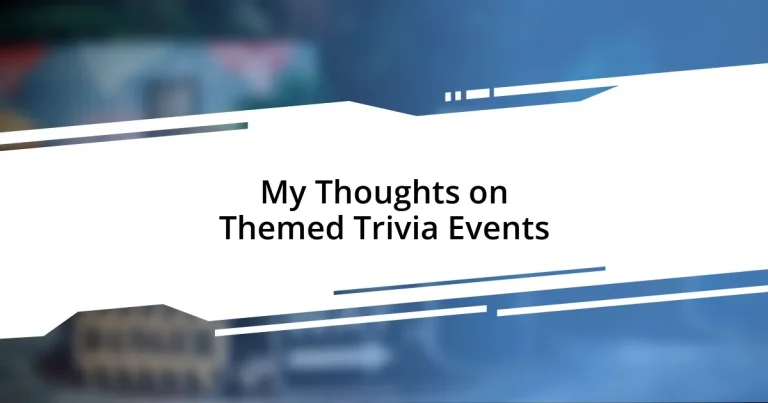Key takeaways:
- Themed trivia events enhance knowledge retention, spark conversations, and foster social bonds among participants.
- Choosing an engaging theme and balancing question difficulty are key to ensuring participation and enjoyment.
- Incorporating interactive elements and team-based challenges can elevate the overall experience and maintain energy levels.
- Evaluating event success through participant feedback, engagement levels, and social media interaction provides valuable insights for future events.
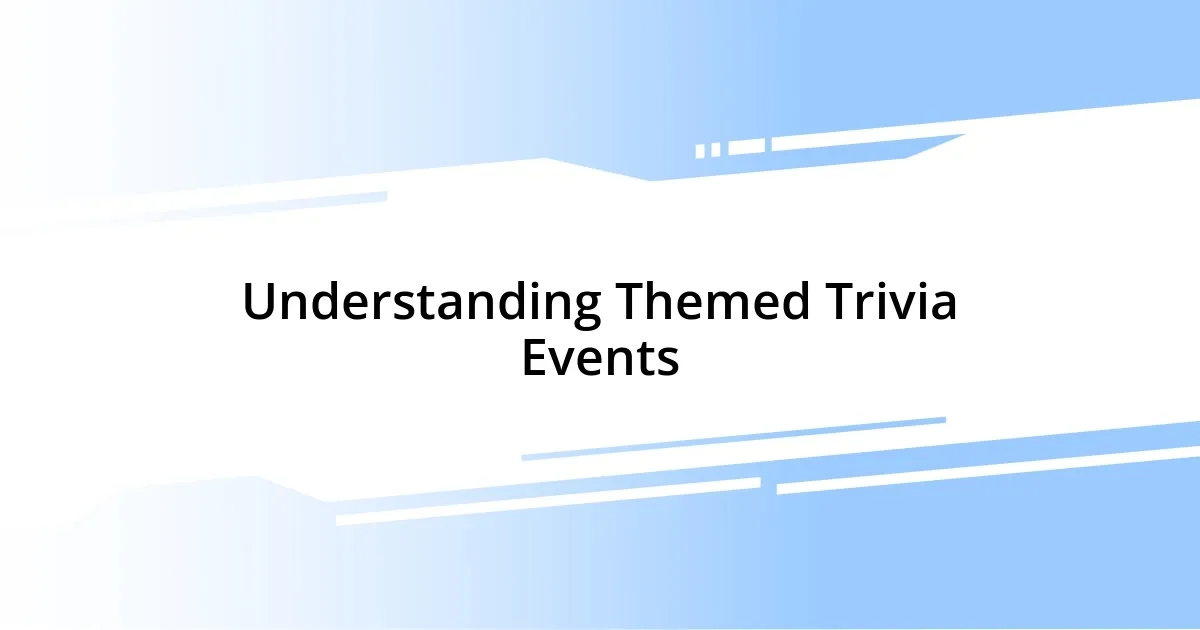
Understanding Themed Trivia Events
Themed trivia events blend fun and learning, creating an engaging atmosphere that often reflects popular culture, history, or specific interests. I remember attending a Harry Potter-themed trivia night; the excitement in the room was palpable as fans eagerly discussed spells and characters. Can you imagine the thrill of uncovering niche details that only true enthusiasts would know?
One of the most captivating aspects of these events is their ability to foster camaraderie. When you team up with friends, you’re not just competing; you’re reminiscing and strategizing together. I once joined a team for a ’90s nostalgia night, and the laughter we shared over our favorite TV shows made the experience unforgettable. Isn’t it fascinating how these shared moments can strengthen friendships?
Furthermore, themed trivia events serve as a platform for inclusivity, catering to diverse interests and knowledge levels. Whether you’re a casual observer or a hardcore fan, there’s a place for you in the trivia circle. I’ve mostly found myself in events where the questions range from easy to tough, ensuring everyone can contribute in their own way. How refreshing is it to see even the shyest person light up when they answer a question correctly?
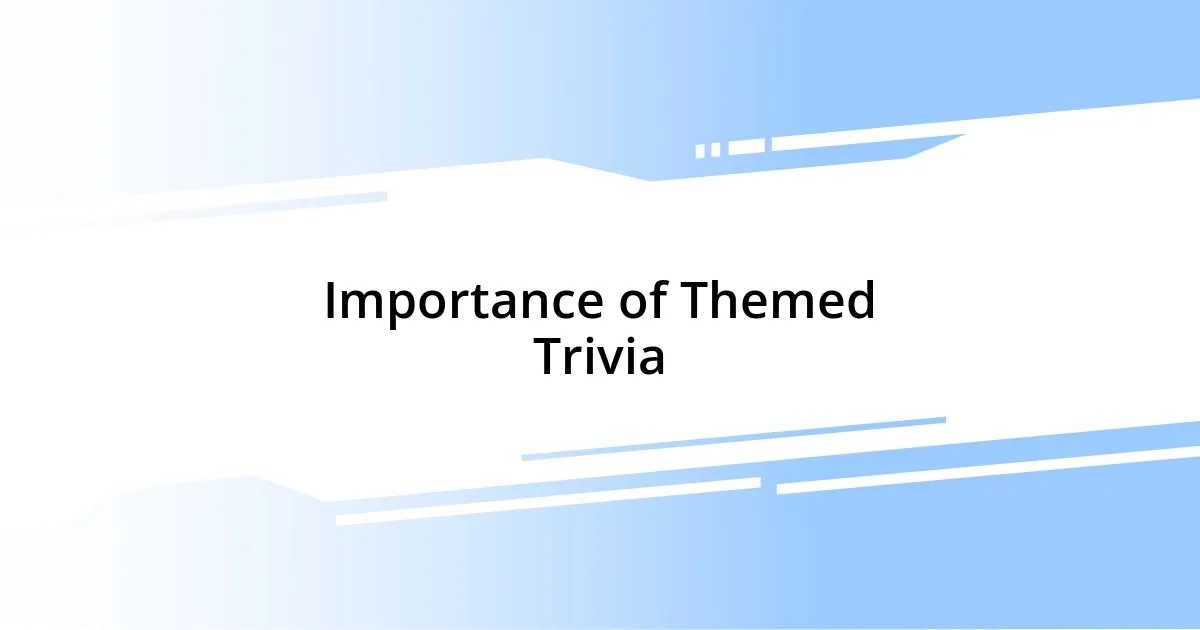
Importance of Themed Trivia
Themed trivia holds significant importance for both personal development and social interaction. I recall a recent Star Wars trivia night where not only did I enjoy testing my knowledge, but I also learned fascinating facts I never knew, like the origins of certain character names. The sheer joy of discovering new information made me appreciate the depth of the universe even more, boosting my engagement.
- Enhances knowledge retention by linking facts to themes you’re passionate about.
- Sparks interesting conversations and debates among participants.
- Offers a low-pressure environment to learn, share, and connect with others.
- Brings communities together, fostering a sense of belonging among fans.
The impact of themed trivia stretches beyond mere entertainment; it creates lasting memories and friendships. At a Marvel-themed trivia event, the shared excitement and joy of team members reminiscing about our favorite heroes felt transformative. I’ve never laughed so hard as when my friend passionately defended a less popular character, and it reminded me of how shared interests can pave the way for deeper connections.

Tips for Hosting Trivia Events
When hosting a trivia event, selecting the right theme can set the tone for the entire experience. I recall a themed trivia night focusing on ’80s music, where everything from the decorations to the questions sparked nostalgia. It’s essential to choose a theme that resonates with your audience, as this engagement can significantly enhance participation and enjoyment.
Another key factor is crafting questions that cater to different knowledge levels. I’ve had experiences where a single tough question left an entire room stumped, which led to awkward silence. Balancing easy and challenging questions not only keeps things exciting but ensures all participants can contribute. It’s amazing how a well-placed humorous question can keep the atmosphere lively, as I’ve noticed plenty of laughter erupting during lighthearted segments of the quiz.
Finally, consider incorporating interactive elements, such as music clips or visual cues, to add layers to your trivia game. I once hosted an event featuring video clips of popular movie quotes; the excitement of guessing the right film created an electric atmosphere. This multi-sensory approach not only keeps participants engaged but encourages teamwork as everyone suddenly leans in, trying to piece together the clues.
| Tip | Description |
|---|---|
| Select an Engaging Theme | Choose a theme that resonates with your audience for better participation. |
| Balance Question Difficulty | Craft questions that cater to varying knowledge levels to keep everyone involved. |
| Add Interactive Elements | Incorporate music clips or visuals to enhance engagement and connection among participants. |
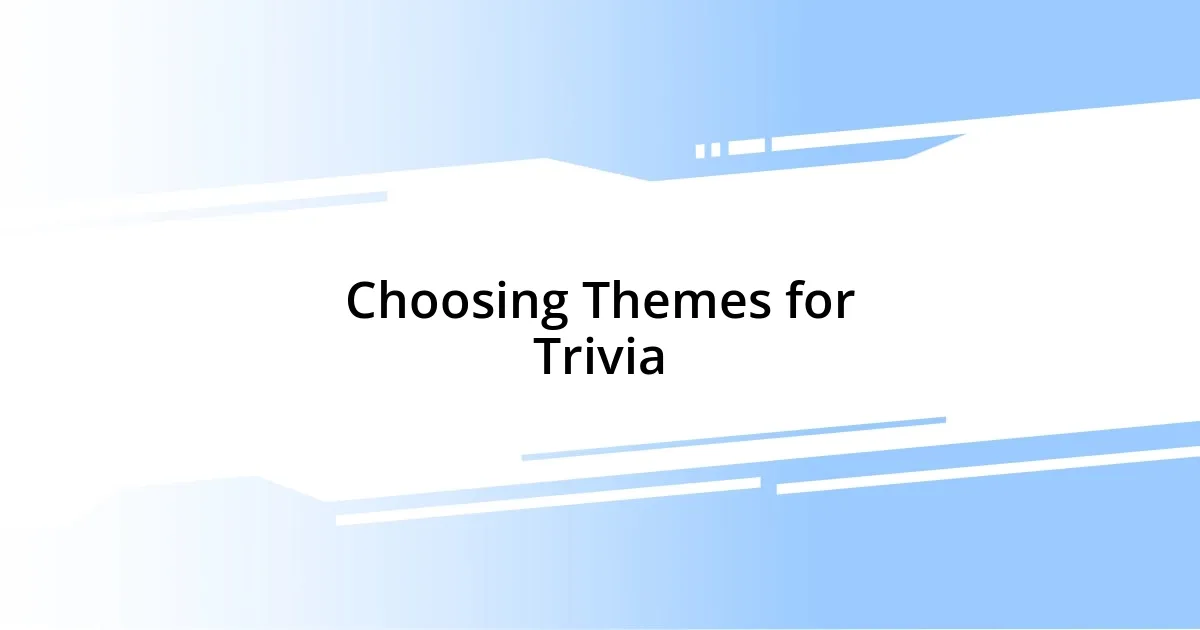
Choosing Themes for Trivia
Choosing the right theme for your trivia event is crucial. I often think back to a “Harry Potter” trivia night I attended. The excitement in the room was palpable as everyone sported house colors and debated spell names. Isn’t it incredible how a shared theme can instantly create a sense of belonging among participants? That night was filled with laughter, rivalry, and even some friendly debates over whether Dumbledore was the best wizard!
It’s fascinating how personal interests can guide theme selection. I remember hosting a trivia event centered around classic novels. I decorated the venue with quotes and illustrations, bringing those stories to life. I felt a real connection with other literature lovers as we shared insights and stories behind our favorite books. That kind of thematic investment encourages participants to engage more deeply—don’t you agree that being surrounded by familiar symbols and references fosters a more vibrant atmosphere?
Experimenting with niche themes can also yield surprising results. I once organized a trivia night dedicated to obscure historical events. While I anticipated a more subdued response, the quirky nature of the questions ignited a passionate discussion about forgotten legends. That unexpected enthusiasm taught me that creativity in theme selection can lead to unique experiences that linger in the hearts of participants long after the event has ended. Have you ever considered a theme that might seem unusual but could spark curiosity?
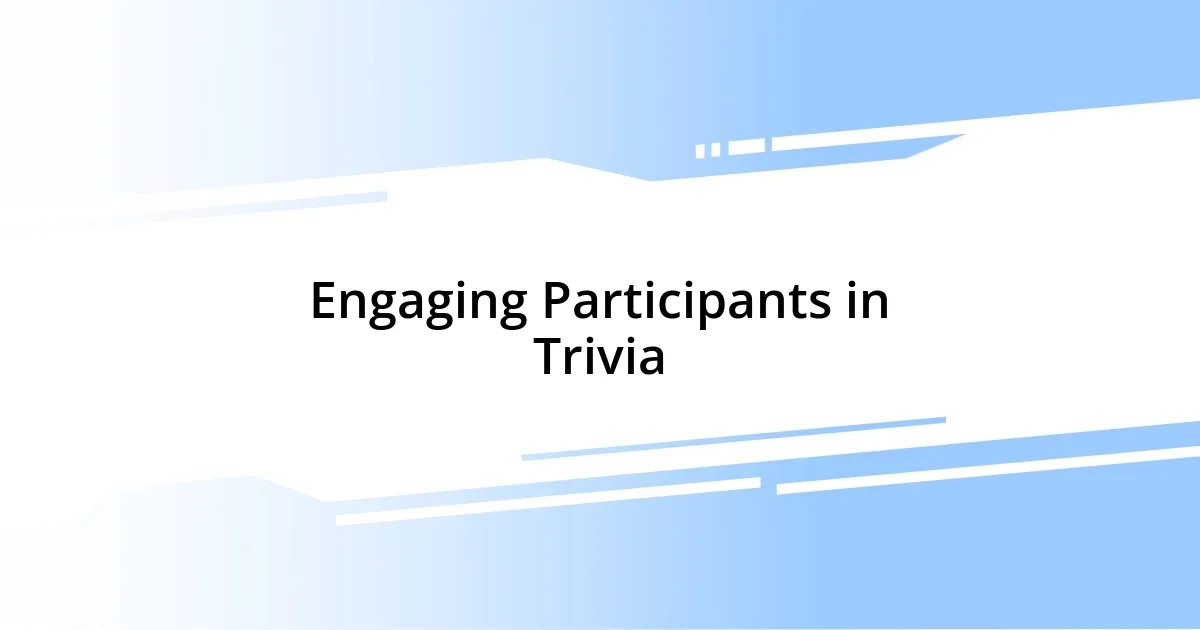
Engaging Participants in Trivia
One of the best ways to keep participants engaged during trivia is to create an interactive experience that feels dynamic rather than static. I remember a trivia night where we used live polling apps, allowing everyone to submit answers via their smartphones. This not only made it easier for shy participants to voice their opinions but also added an element of friendly competition that was palpable in the room. Have you ever felt that rush of excitement when you see how others answer? It’s a fantastic way to build camaraderie and keep everyone actively involved.
Another effective strategy is to incorporate team-based challenges. I once organized a trivia event where teams had to collaborate on visual puzzles related to the theme. Watching participants huddle together, strategizing and cheering each other on was infectious. There’s something special about working together toward a common goal, don’t you think? It fosters relationships and encourages people to step outside their comfort zones, enhancing the overall atmosphere of the night.
Lastly, I believe it’s essential to create pacing that allows for natural breaks. During a long trivia session I attended, the host periodically paused for quick discussions or fun anecdotes related to the questions. This not only allowed participants to stretch their legs but also generated lively conversations, making the event feel more like a gathering of friends than a stiff competition. Have you ever noticed how a simple pause can reinvigorate a group? Finding that balance is key to maintaining enthusiasm and energy throughout the event.
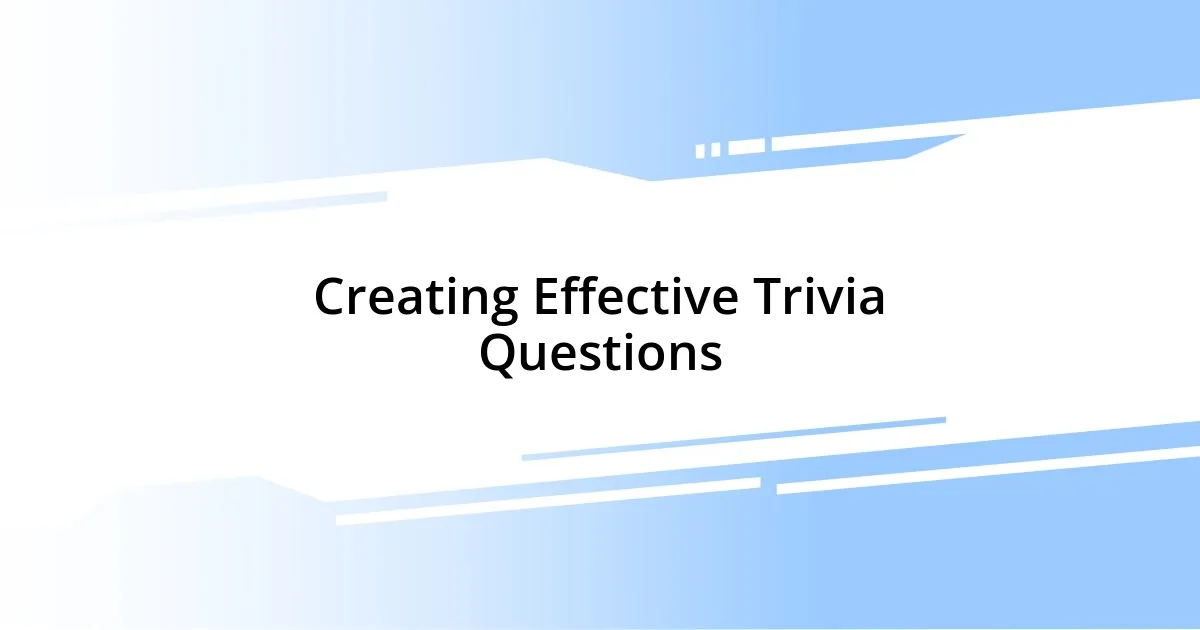
Creating Effective Trivia Questions
Creating effective trivia questions is more than just throwing random facts into the mix. I recall an event where I crafted questions that not only tested knowledge but also sparked conversation among participants. For instance, asking “What fictional character said, ‘It’s levio-sa, not levio-sar’?” instantly ignited nostalgia and debates among die-hard fans. Doesn’t it feel great when a question leads to a rich dialogue rather than just a hand-raising race?
Another vital aspect is ensuring that questions vary in difficulty. During one unforgettable trivia night, I started with simple questions that got everyone warmed up. As we moved into the harder ones, the mix of groans and cheers was incredible. I noticed how those tricky questions challenged participants to dig deeper, leading to intriguing discussions at our tables. Wouldn’t you agree that a well-balanced trivia set keeps everyone on their toes and maintains engagement throughout the night?
Lastly, I’ve found it beneficial to tie questions back to personal experiences or shared cultural moments. Once, I asked, “Which movie features a character saying, ‘I am your father’?” The room erupted with laughter and everyone chimed in with their favorite movie memories. This approach adds depth and connection, making questions stick in the minds of participants long after the event. Have you ever felt as if a trivia question transported you back in time or reminded you of the people you shared experiences with? That’s the kind of magic we should strive for in every trivia event.

Evaluating Your Trivia Event Success
Evaluating the success of your trivia event often hinges on the participant experience. I once attended a themed trivia night where feedback forms were handed out at the end. This simple touch not only measured satisfaction but also provided invaluable insights into what resonated with the audience. Have you ever wondered how that feedback could shape your future events?
Another aspect to consider is attendance and engagement levels throughout the night. I’ve noticed that during certain rounds where the questions were particularly exciting, the energy in the room spiked. Watching people lean in, laughing and shouting answers, gave clear indicators that we hit the mark. It’s fascinating to reflect—do your attendees actively participate, or do they seem disengaged?
Lastly, analyzing the social media interaction surrounding your event is crucial. After one trivia night, I was thrilled to see participants sharing their experiences online. Posts filled with selfies, team photos, and funny moments created a buzz that extended beyond the event itself. Doesn’t it feel rewarding when people continue the conversation long after they’ve left? These are the metrics that truly reflect an event’s success and its impact on participants.












